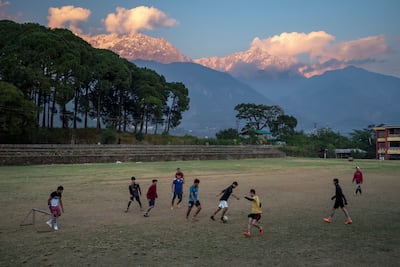Every time a World Cup came around, the south Kolkata neighbourhood in which I spent several of my boyhood years would be transformed. Walls would become canvases. On them would be nearly life-sized, life-like paintings of Brazilian football players. Kolkata, a city of self-styled aesthetes, would bow at the altar of o jogo bonito. And who could exemplify the beautiful game better than Brazil?
In 1986, though, things changed. The walls remained decked-up the way they used to be. But as Diego Armando Maradona exploded on to our TV screens and singlehandedly won Argentina the World Cup in Mexico, hundreds of thousands of fans in the city made him the object of their veneration. Argentina became, in the hearts of football followers, at least as much of a popular team to root for as Brazil.
The Indian football fan is faced with this problem before every international tournament. Which team to support? And this conundrum is not unique to India. After all, only 32 countries are playing in the 2022 World Cup that kicks off in Qatar on Sunday. Merely 32. That is far, far fewer than the number of countries across the world that have fanatical football fans.
However disgruntled he may be over coach Didier Deschamps’s defensive approach, however much he may believe that the goalkeeper, Hugo Lloris, is past his prime, the French fan will always support France. Certain English fans feel that Gareth Southgate should not have been coach for this World Cup. Many are vocal about how they want a more prominent role for the flamboyant playmaker, Jack Grealish. But when play begins in a full, rowdy stadium, they get behind England.
For fans in countries which are not in the competition, and are unlikely to ever be, the solution is to idealise star power. To pick one’s favourite player and root for the team he plays for. Johann Cryuff and the Netherlands. Franz Beckenbauer and West Germany. Paolo Maldini and Italy. Lionel Messi and Argentina. Kylian Mbappe and France. Ronaldo and Portugal. Neymar and Brazil. Luka Modric and Croatia. In this way, these fans turn a team game almost into an individual sport.

This is also much of a piece with our current sporting and cultural climate. It is an environment in which, amid the white noise of social media commentary and strident punditry, the sport-industrial complex is crazed with the notion of celebrity more than ever before. The obscenely wealthy, celebrity footballer as a brand often bigger than the team he plays for – from David Beckham to Cristiano Ronaldo – is one of the most recognisable cultural tropes of our times.
The philosophy of a certain way of playing, be it Brazil’s jogo bonito, or Spain’s mesmerising tiki taka, all fluid passes and geometric movement, has traditionally inspired their own following. However, in terms of the quality of football, the World Cup is no patch on elite European club football, including, above all, the Champions League. The top clubs cherry-pick the best players in the world. So, when two leading club sides turn out against one another, the intensity and quality of play, and the galaxy of star players on show, are of a different dimension. In the World Cup, on the other hand, especially in the group stages, there are always lots of underwhelming matches.
In that context, it is simpler for a fan from a non-playing country to pick his favourite player and throw the weight of his support behind the country that footballer plays for. And it is so easy to have favourites these days. With leagues and domestic cups from around the world being streamed or telecast live through the season, there is a huge smorgasbord of action for the fan to devour. He is far more exposed to star players and their styles of play, their strengths and their attractions, than, say, in the 1970s and 1980s. Those were the days when the only whiff of global football the fan would get was from tournaments like the World Cup or the Euros.
This World Cup offers us, probably for the last time on this stage, two of the greatest club footballers of all time: Messi and Ronaldo. Messi has scored 90 goals for Argentina; Ronaldo has scored 117 for Portugal. The two men have defined and illuminated elite European club football for years and years. But neither has had success at a World Cup. Messi won the Copa America in 2021 – his most significant achievement in the colours of his country. Ronaldo’s Portugal won the Euros in 2016. Argentina are one of the favourites at the tournament. So are Brazil, whose star player, Neymar, has not won a World Cup either. Kylian Mbappe – the teenaged prodigy from the 2018 edition and now arguably the world’s most electrifying attacker and biggest celebrity footballer – has already won one World Cup.
Their legions of fans will be keenly watching. It is a mouth-watering prospect.


